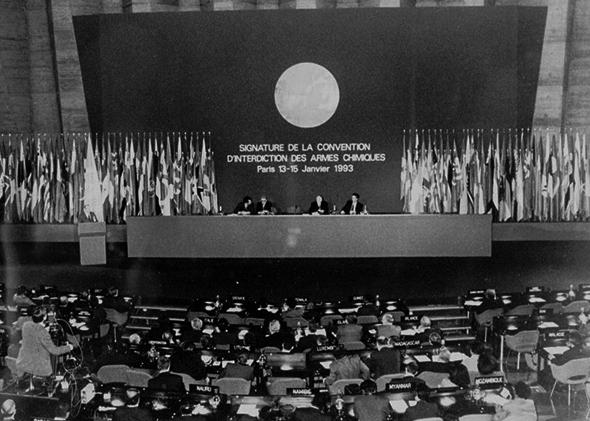The Supreme Court batted down a long-awaited dispute over the 10th Amendment, treaty powers, and international chemical weapons this morning with a 9–0 opinion in Bond v. United States. The appeal had been lurking as a potential blockbuster decision. In addition to having a factual scenario that appears to have been lifted directly out of the pages of The Real Housewives of a Middle School Chemistry Lab, the case could have been a major ruling on federalism and congressional power. People who care about Tea Party efforts to shrink government down to the size of a test tube were worried. But Monday morning the high court ruled—in a unanimous exercise of comic power—that the federal government should never have been using an international chemical weapons treaty to prosecute a jealous wife in the first place.
The facts of the case are not the sort that usually come before the justices. Carol Anne Bond of Lansdale, Pennsylvania, found out that her best friend was pregnant and that the father was her own husband, Clifford Bond. Her vengeance involved stealing chemicals from her job with chemical-maker Rohm and Haas, and ordering others from Amazon and putting them all on various surfaces that the woman might touch—doorknobs, car door handles, and a mailbox. She tried this 24 times, but because the substance turns bright orange when it touches metal, the mistress was deftly able to avoid touching it most of the time. In a dramatic climax, the chemicals finally burned the pregnant woman’s thumb a little, and federal officials nabbed Bond.
She was sentenced to six years in federal prison under the Chemical Weapons Convention Implementation Act, a statute that was Congress’ implementation of the international Chemical Weapons Convention treaty. Instead of trusting Pennsylvania law to discipline Ms. Bond for her admittedly dangerous behavior, she was being charged under a federal law regulating chemical warfare. The question for the court was whether Bond should be charged under that draconian act at all. The answer today: Federal laws intended to prevent the international use of chemical weapons can’t be used against the lady wife who tried to poison her husband’s ladyfriend.

Courtesy of Michel Claude/U.N. Photo
The case has been up and back to the Supreme Court twice, but, in a decision Monday authored by Chief Justice John Roberts (and with a host of concurring opinions by assorted others), the court made it clear that Bond v. United States was simply too silly to become a landmark anything, and the opinion itself is now destined to become a landmark entry into the collected comedy stylings of Chief Justice Roberts. The upshot of the decision is that “because our constitutional structure leaves local criminal activity primarily to the States, we have generally declined to read federal law as intruding on that responsibility.” And that, “The Chemical Weapons Convention Implementation Act contains no such clear indication, and we accordingly conclude that it does not cover the unremarkable local offense at issue here.”
Hard to narrow the opinion down to its best laugh lines, but here are some of my favorites, and it’s worth noting that, as we have seen in the past, sometimes Roberts’ best straight man is the Webster’s New International Dictionary:
- “Both chemicals are toxic to humans and, in high enough doses, potentially lethal. It is undisputed, however, that Bond did not intend to kill Haynes. She instead hoped that Haynes would touch the chemicals and develop an uncomfortable rash.”
- “The chemicals that Bond used are easy to see, and Haynes was able to avoid them all but once. On that occasion, Haynes suffered a minor chemical burn on her thumb, which she treated by rinsing with water.”
- “As a matter of natural meaning, an educated user of English would not describe Bond’s crime as involving a ‘chemical weapon.’ Saying that a person ‘used a chemical weapon’ conveys a very different idea than saying the person ‘used a chemical in a way that caused some harm.’”
- “The use of something as a ‘weapon’ typically connotes ‘[a]n instrument of offensive or defensive combat,’ (Webster’s Third New International Dictionary), or ‘[a]n instrument of attack or defense in combat, as a gun, missile, or sword,’ American Heritage Dictionary. But no speaker in natural parlance would describe Bond’s feud-driven act of spreading irritating chemicals on Haynes’s door knob and mailbox as ‘combat.’”
- “Nor do the other circumstances of Bond’s offense—an act of revenge born of romantic jealousy, meant to cause discomfort, that produced nothing more than a minor thumb burn—suggest that a chemical weapon was deployed in Norristown, Pennsylvania.”
- “The Government would have us brush aside the ordinary meaning and adopt a reading of section 229 that would sweep in everything from the detergent under the kitchen sink to the stain remover in the laundry room. … Any parent would be guilty of a serious federal offense—possession of a chemical weapon—when, exasperated by the children’s repeated failure to clean the goldfish tank, he considers poisoning the fish with a few drops of vinegar. We are reluctant to ignore the ordinary meaning of ‘chemical weapon’ when doing so would transform a statute passed to implement the international Convention on Chemical Weapons into one that also makes it a federal offense to poison goldfish.”
- “Section 229 implements the Convention, but Bond’s crime could hardly be more unlike the uses of mustard gas on the Western Front or nerve agents in the Iran-Iraq war that form the core concerns of that treaty. There are no life-sized paintings of Bond’s rival washing her thumb.”
- “In sum, the global need to prevent chemical warfare does not require the Federal Government to reach into the kitchen cupboard, or to treat a local assault with a chemical irritant as the deployment of a chemical weapon.”
Justices Antonin Scalia, Clarence Thomas, and Samuel Alito concurred in the judgment in the Roberts opinion because they agreed that Bond’s conviction should be overturned.* They would have also liked to strike down the whole statute on constitutional grounds, agreeing with some conservative thinkers that the Justice Department’s claim to broad statutory authority is too dangerous. But sometimes the chief justice, with a dictionary, in the library, is the only thing that stands between one form of legal overreach and another.
This post has been updated for clarity.
*Correction, June 3, 2014: The article originally indicated that the three concurring justices joined the opinion. They joined only as to the judgment.
